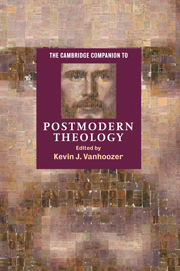Book contents
- Frontmatter
- Part 1 Types of postmodern theology
- 1 Theology and the condition of postmodernity
- 2 Anglo-American postmodernity
- 3 Postliberal theology
- 4 Postmetaphysical theology
- 5 Deconstructive theology
- 6 Reconstructive theology
- 7 Feminist theology
- 8 Radical orthodoxy
- Part 2 Christian doctrine in postmodern perspective
- Index
8 - Radical orthodoxy
from Part 1 - Types of postmodern theology
Published online by Cambridge University Press: 28 May 2006
- Frontmatter
- Part 1 Types of postmodern theology
- 1 Theology and the condition of postmodernity
- 2 Anglo-American postmodernity
- 3 Postliberal theology
- 4 Postmetaphysical theology
- 5 Deconstructive theology
- 6 Reconstructive theology
- 7 Feminist theology
- 8 Radical orthodoxy
- Part 2 Christian doctrine in postmodern perspective
- Index
Summary
The volume Radical Orthodoxy bears the subtitle “A New Theology.” This could easily mislead readers, preventing them from understanding radical orthodoxy. It is not a “new” theology. If it were to present itself as such, it would merely take the form of one more “modern” theology, which radical orthodoxy is not. Although it could qualifiedly be labeled postmodern, radical orthodoxy is neither a newer nor improved version of modern theology, for an interminable “newness” characterizes modernity. As Gianni Vattimo tells us: “if we say that we are at a later point than modernity, and if we treat this fact as in some way decisively important, then this presupposes an acceptance of what more specifically characterizes the point of view of modernity itself, namely the idea of history with its two corollary notions of progress and overcoming.” Through overcoming the past, modernity progresses toward the new. Precisely because radical orthodoxy is not a “modern” theology it does not overcome the past - not even a modernity that can never be past - or progress toward the novel.
“Modern” theology looks for new categories within which to present a theological essence, usually understood in terms of a “mystery” that transcends the “new” categories used for its expression. Like modernity itself, modern theology is “progressive”; moving from the old toward the new, which never quite arrives. Thus modern theology is caught within a dialectic of presence and absence. It moves from what it lacks – the promised but absent “new” – toward what it hopes for – the presence of the new. In this movement the past is continually dissolved into an absent future, which promises to render the past and all its sacrifices meaningful. Progress becomes our fate and ethics is tied to a sacrificial economy. We are taught to sacrifice particular interests and commitments for the sake of the future arrival of the new. Postmodernity places this modern progress in question. Like postmodernity, radical orthodoxy seeks to escape the constraints of modern progress.
- Type
- Chapter
- Information
- The Cambridge Companion to Postmodern Theology , pp. 126 - 146Publisher: Cambridge University PressPrint publication year: 2003

